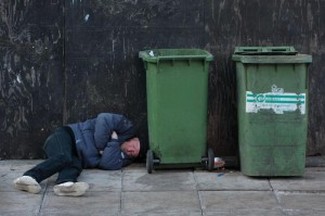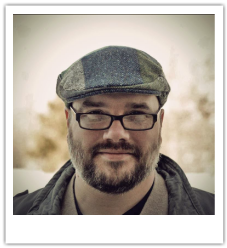|
4/23/2015 Comments Resisting the Disposable CultureBy: Mark VanSteenwyk Note: This article originally appeared on Mark's blog Recently, Pope Francis has been issuing challenges to our capitalist system–how it nurtures exclusion, inequality, and death. He has gotten pushback from the likes of Rush Limbaugh for sounding like a Marxist. I am thankful that the Pope is using his pulpit this way. Here’s an example: How can it be that it is not a news item when an elderly homeless person dies of exposure, but it is news when the stock market loses two points? This is a case of exclusion. Can we continue to stand by when food is thrown away while people are starving? This is a case of inequality. Today everything comes under the laws of competition and the survival of the fittest, where the powerful feed upon the powerless. As a consequence, masses of people find themselves excluded and marginalized: without work, without possibilities, without any means of escape.  I agree with the Pope: what we see in our era of late modern consumer capitalism goes beyond conventional exploitation and oppression. The cost of human lives is now factored in as commodity; using up human lives–in wars or in factories–is a cost of doing business. We have entered a new era of disposable humanity. But it begs the question: What do we do about it? It is one thing to agree with the Pope and share his wisdom on Facebook, Twitter, or (for those stuck in 2004) the blogosphere. Beyond that, we may even try to influence our legislators when we feel stirred. But often such righteous passions are fleeting. How do we respond to the growing devaluing of human beings? Our first instinct, I suspect, is to distance ourselves from this process of dehumanization. We sympathize with the oppressed and cast off, but it has little to do with us. Unfortunately, this process of dehumanization has left its imprint on our souls. Researchers Lasana Harris (Duke University) and Susan Fiske (Princeton University) explored the way in which people differentiate between objects and people. When we see another human face, there is increased activity in the medial pre-frontal cortex (mPFC). This area isn’t as active when looking at objects. Harris and Fiske found that most test subjects didn’t show increased activity in the mPFC when viewing images of those who belonged to an outgroup (like folks who look homeless). This wasn’t a choice that the test subjects made–the test measured an immediate physiological response. In other words, most of us see homeless people as objects, not people. This phenomenon is called infrahumanization: when we see our ingroup as more human than an outgroup. We are a part of a system that dehumanizes people. And we help perpetuate that system. In Matthew 25, Jesus reminds us that whatever we do “for one of the least of these brothers and sisters,” you do for him. It was this teaching (and many other teachings about the poor) challenged my wife and I to start an intentional community that centers its way of life on the practice of hospitality. We try to orient our life together around welcoming the stranger. We have two houses of hospitality that frequently receive guests in need of a place to live. Often, when sharing with groups about our community’s practice of hospitality, I get pushback. The pushback goes something like this: “It is good that you offer hospitality to those in need. But what about society? Do you think society should be left to itself? In the big scheme of things, what difference are you making?” I understand the concern here. Millions struggle against injustice. Many are hungry or threatened with violence. The needs are so great that, when someone comes along talking about the glories of hospitality, it seems like they’re offering a bandaid to care for someone with an open chest wound. But such criticism miss the point. We don’t offer hospitality simply to help folks out; we offer hospitality because we are inhospitable. We don’t welcome strangers because we have great love…we do so because we recognize our own tendencies to exclude. And here’s the facinating thing–the more involved I get in the lives of guests, the more I’m motivated by a growing sense of love to address the systems around me. Caring about poverty in abstraction may motivate you to vote for change. But knowing and loving Michael or Aaron or Lori or Martin or Susan causes you to fight for justice over the long haul. For love’s sake even a grumpy anarchist like me has found himself sitting at a conference table with the mayor. Caring about an abstract cause is good. Loving your neighbor and, out of that love, resisting the disposable culture is far better. It begins with looking strangers in the eyes. With a smile. It means welcoming folks to your table, into your life. The most important thing we can do for our own souls is to see the humanity of others and celebrate it.
Comments
|
Disclaimer
The viewpoints expressed in each reader-submitted article are the authors own, and not an “official Jesus Radicals” position. For more on our editorial policies, visit our submissions page. If you want to contact an author or you have questions, suggestions, or concerns, please contact us. CategoriesAll Accountability Advent Anarchism Animal Liberation Anthropocentrism Appropriation Biblical Exegesis Book Reviews Bread Capitalism Catholic Worker Christmas Civilization Community Complicity Confessing Cultural Hegemony Decolonization Direct Action Easter Economics Feminism Heteropatriarchy Immigration Imperialism Intersectionality Jesus Justice Lent Liberation Theology Love Mutual Liberation Nation-state Nonviolence Occupy Othering Pacifisim Peace Pedagogies Of Liberation Police Privilege Property Queer Racism Resistance Resurrection Sexuality Solidarity Speciesism Spiritual Practices Technology Temptation Veganism Violence War What We're Reading On . . . White Supremacy Zionism ContributorsNekeisha Alayna Alexis
Amaryah Armstrong Autumn Brown HH Brownsmith Jarrod Cochran Chelsea Collonge Keith Hebden Ric Hudgens Liza Minno Bloom Jocelyn Perry Eda Ruhiye Uca Joanna Shenk Nichola Torbett Mark VanSteenwyk Gregory Williams Archives
October 2017
|
Search by typing & pressing enter


 RSS Feed
RSS Feed